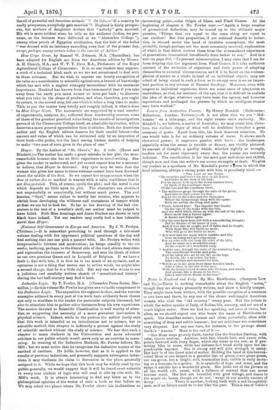Inductive Logic. By T. Fowler, M.A. (Clarendon Press Series, Mac-
tnillan.)—In this volume Mr. Fowler has given us a valuable complement to his Deductive Logic. The exposition throughout is clear, and the various examples adduced in every part of the work have evidently been chosen not only to elucidate to the reader the particular subjects discussed, but also to stimulate him to gather other instances from his own experience. The section devoted to Scientific Classification is well worthy of atten- tion, as suggesting the necessity of a more prevalent instruction in physical science. Indeed, while in the preface tbe author justly says that this work is intended as an introduction not to science, but to :scientific method, this chapter is indirectly a protest against the study of scientific method without the study of science. We fear that such a chapter to many students in the Universities and more advanced scholars in our public schools would serve only as an exercise in cram- ming. I,n treating of the Inductive Methods, Mr. Fowler follows Mr. Mill; but we must notice that he recognizes the deductive nature of the I:teethed of residues. He holds, however, that as it is applied to the results of previous inductions, and generally suggests subsequent induc- tions, it may vindicate its claim to discussion in the place generally assigned to it. While we hope that this book may be widely read by the public generally, we would suggest that it will be found most valuable to every true student of logic who will read it side by side with Mr. 'Mill's work. It is always interesting to find any hints as to the philosophical opinions of the writer of such a book as that before us. We may select two places where Mr. Fowler shows his inclinations on interesting points,—the Origin of Ideas, and Final Causes. At the beginning of chapter v. Mr. Fowler says :—" Again, a large number of geometrical deductions may be traced up to the ultimate major premiss, Things that are equal to the same thing aro equal to one another.' But this proposition, if not referred directly to induc- tion, is classed under the head of intuitive conceptions, the most probable, though perhaps not the most commonly received, explanation of which is that which derives them from the accumulated experience of generations, transmitted hereditarily from father to son." And in a note on page 316, "To prevent misconception, I may state that I am far from denying that the argument from Final Causes, if it take sufficient account of the evolution of organisms and their power of adapting themselves to external circumstances, and if it be based on the contem- plation of nature as a whole, instead of on individual objects, may not admit of being stated in such a form as to occupy once more an impor- tant position in any scheme of Natural theology. Moreover, even with respect to individual organisms, there are some cases of adaptation BO marvellous, as that, for instance, of the eye, that it is difficult to exclude the idea of design, whatever may have been the agency, and however mysterious and prolonged the process by which an intelligent creator may have worked."


































 Previous page
Previous page